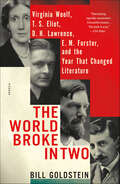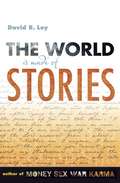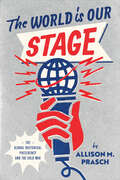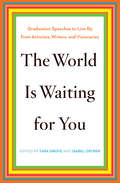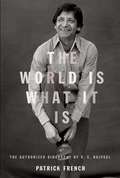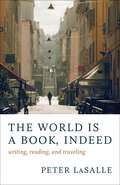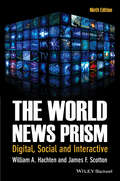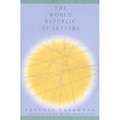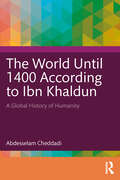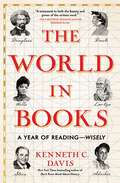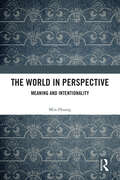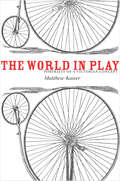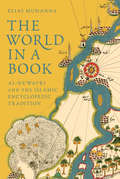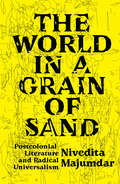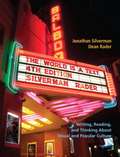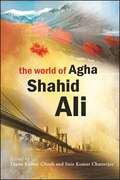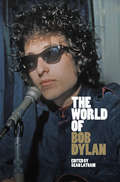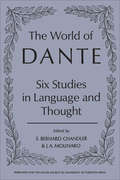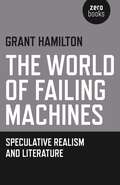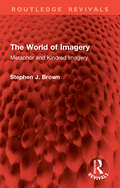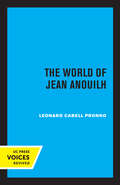- Table View
- List View
The World Beyond the Hill: Science Fiction and the Quest for Transcendence
by Alexei Panshin Cory PanshinThe world in which we live has been shaped by the myths of science fiction. In that vast imaginative universe of mystery and endless possibility, the darkest nightmares and the grandest aspirations of scientific man have been given life -- from Frankenstein to Galactic Empire. Looking through the mirror of past science fiction at the reflections of literary inventors such as Jules Verne and H.G. Wells, we can discover the series of steps that led our society to its current state of great accomplishments and even greater confusion. And in the Golden Age stories of writers like Isaac Asimov, Robert Heinlein, and A.E. van Vogt we can discern a mythic prevision of the crucial values, attitudes, and intuitions that underlie the coming age of higher consciousness and holistic understanding. Addressing both those who love science fiction and those who have never read it, The World Beyond the Hill recounts the most central stories of the genre, how they came to be written, and what fundamental human questions they attempted to answer. By telling both the story of science fiction and the stories of science fiction, Alexei and Cory Panshin take us on a journey through the most wonder-filled regions of imagination and bring us home with new insight into our culture, our nature, and our goals. The World Beyond the Hill is a synthesis of remarkable originality. It is both high- quality literature written with clarity, grace, and warmth, and a unique work of research and scholarship. It is biography, history, and social psychology, but most of all it is the recounting of the dream of unknown things, of higher possibilities and of the human quest for transcendence in visions of the mythical but emergent world beyond the hill.
The World Broke in Two: Virginia Woolf, T.S. Eliot, D.H. Lawrence, E.M. Forster, and the Year That Changed Literature
by Bill GoldsteinA Lambda Literary Awards FinalistNamed one of the best books of 2017 by NPR's Book ConciergeA revelatory narrative of the intersecting lives and works of revered authors Virginia Woolf, T. S. Eliot, E. M. Forster and D. H. Lawrence during 1922, the birth year of modernismThe World Broke in Two tells the fascinating story of the intellectual and personal journeys four legendary writers, Virginia Woolf, T. S. Eliot, E. M. Forster, and D. H. Lawrence, make over the course of one pivotal year. As 1922 begins, all four are literally at a loss for words, confronting an uncertain creative future despite success in the past. The literary ground is shifting, as Ulysses is published in February and Proust’s In Search of Lost Time begins to be published in England in the autumn. Yet, dismal as their prospects seemed in January, by the end of the year Woolf has started Mrs. Dalloway, Forster has, for the first time in nearly a decade, returned to work on the novel that will become A Passage to India, Lawrence has written Kangaroo, his unjustly neglected and most autobiographical novel, and Eliot has finished—and published to acclaim—“The Waste Land."As Willa Cather put it, “The world broke in two in 1922 or thereabouts,” and what these writers were struggling with that year was in fact the invention of modernism. Based on original research, Bill Goldstein's The World Broke in Two captures both the literary breakthroughs and the intense personal dramas of these beloved writers as they strive for greatness.
The World Is Made of Stories
by David R. LoyIn this dynamic and utterly novel presentation, David Loy explores the fascinating proposition that the stories we tell--about what is and is not possible, about ourselves, about right and wrong, life and death, about the world and everything in it--become the very building blocks of our experience and of reality itself. Loy uses an intriguing mixture of quotations from familiar and less-familiar sources and brief stand-alone micro-essays, engaging the reader in challenging and illuminating dialogue. As we come to see that the world is made--in a word--of stories, we come to a richer understanding of that most elusive of Buddhist ideas: shunyata, the "generative emptiness" that is the all-pervading quality inherent to all mental and physical forms in our ever-changing world. Reminiscent of Zen koans and works of sophisticated poetry, this book will reward both a casual read and deep reflection.
The World Is Our Stage: The Global Rhetorical Presidency and the Cold War
by Allison M. PraschA fresh account of the US presidential rhetoric embodied in Cold War international travel. Crowds swarm when US presidents travel abroad, though many never hear their voices. The presidential body, moving from one secured location to another, communicates as much or more to these audiences than the texts of their speeches. In The World is Our Stage, Allison M. Prasch considers how presidential appearances overseas broadcast American superiority during the Cold War. Drawing on extensive archival research, Prasch examines five foundational moments in the development of what she calls the “global rhetorical presidency:” Truman at Potsdam, Eisenhower’s “Goodwill Tours,” Kennedy in West Berlin, Nixon in the People’s Republic of China, and Reagan in Normandy. In each case, Prasch reveals how the president’s physical presence defined the boundaries of the “Free World” and elevated the United States as the central actor in Cold War geopolitics.
The World Is Our Stage: The Global Rhetorical Presidency and the Cold War
by Allison M. PraschA fresh account of the US presidential rhetoric embodied in Cold War international travel. Crowds swarm when US presidents travel abroad, though many never hear their voices. The presidential body, moving from one secured location to another, communicates as much or more to these audiences than the texts of their speeches. In The World is Our Stage, Allison M. Prasch considers how presidential appearances overseas broadcast American superiority during the Cold War. Drawing on extensive archival research, Prasch examines five foundational moments in the development of what she calls the “global rhetorical presidency:” Truman at Potsdam, Eisenhower’s “Goodwill Tours,” Kennedy in West Berlin, Nixon in the People’s Republic of China, and Reagan in Normandy. In each case, Prasch reveals how the president’s physical presence defined the boundaries of the “Free World” and elevated the United States as the central actor in Cold War geopolitics.
The World Is Our Stage: The Global Rhetorical Presidency and the Cold War
by Allison M. PraschA fresh account of the US presidential rhetoric embodied in Cold War international travel. Crowds swarm when US presidents travel abroad, though many never hear their voices. The presidential body, moving from one secured location to another, communicates as much or more to these audiences than the texts of their speeches. In The World is Our Stage, Allison M. Prasch considers how presidential appearances overseas broadcast American superiority during the Cold War. Drawing on extensive archival research, Prasch examines five foundational moments in the development of what she calls the “global rhetorical presidency:” Truman at Potsdam, Eisenhower’s “Goodwill Tours,” Kennedy in West Berlin, Nixon in the People’s Republic of China, and Reagan in Normandy. In each case, Prasch reveals how the president’s physical presence defined the boundaries of the “Free World” and elevated the United States as the central actor in Cold War geopolitics.
The World Is Waiting for You: Graduation Speeches to Live By from Activists, Writers, and Visionaries
by Edited by Tara Grove and Isabel OstrerInspiring commencement speeches from Wynton Marsalis, Toni Morrison, Gloria Steinem, and others: &“The perfect gift for grads-to-be&” (O, The Oprah Magazine). &“The voices of conformity speak so loudly. Don&’t listen to them,&” acclaimed author and award-winning journalist Anna Quindlen cautioned graduates of Grinnell College. Jazz virtuoso and educator Wynton Marsalis advised new Connecticut College alums not to worry about being on time, but rather to be in time—because &“time is actually your friend. He don&’t come back because he never goes away.&” And renowned physician and humanitarian Paul Farmer revealed at the University of Delaware his remarkable discovery—the new disease Empathy Deficit Disorder—and assured the commencers it could be cured. The prescient, fiery feminism of Gloria Steinem sits parallel to that of celebrated writer Ursula K. Le Guin, who asks, &“What if I talked like a woman right here in public?&” Nobel Prize–winning author Toni Morrison sagaciously ponders how people centuries from now will perceive our current times, and Pulitzer Prize–winning author Barbara Kingsolver asks those born into the Age of Irony to &“imagine getting caught with your Optimism hanging out&” and implores us always to act and speak the truth. With eighteen rousing graduation speeches, The World Is Waiting for You speaks to anyone who might take to heart the advice of Planned Parenthood president Cecile Richards—&“life as an activist, troublemaker, or agitator is a tremendous option and one I highly recommend&”—and is the perfect gift for all who are ready to move their tassels to the left.
The World Is What It Is: The Authorized Biography of V. S. Naipaul
by Patrick FrenchV.S. Naipaul's biographer aims not to sit in judgment of the Nobel laureate, but to expose the subject with ruthless clarity to the calm eye of the reader. In this he succeeds admirably. Descendant of poor Brahmins, born in 1932 in Trinidad and educated in Oxford, Naipaul is haunted by matters of race, colonialism and sex. He is, says award-winning author French (Younghusband), both the racist (against those darker than he) and the victim of racial prejudice, tendencies that come through in his novels and in his treatment of friends and lovers. Haunting this biography are Naipaul's women. His wife, Pat, supported him, overlooked his affairs and his visits with prostitutes, and subordinated herself to his genius; Naipaul gave equally little to Margaret, his mistress.
The World Is a Book, Indeed: Writing, Reading, and Traveling
by Peter LaSalleThe World Is a Book, Indeed chronicles in eleven rich personal essays the ongoing quest of award-winning writer Peter LaSalle to embark on offbeat, often startlingly revelatory literary travel. LaSalle spends a summer roaming the lesser-known quarters of Paris, haunted by the writing of the French surrealists. In Hanoi, he meets for beers with the editors—two military men—of the Army Literature and Arts Magazine while investigating Vietnam’s acknowledged great modern novel, Bao Ninh’s The Sorrow of War. Other pieces find LaSalle on a strange nighttime drive through the streets of sprawling São Paulo in search of landmarks associated with Brazilian modernist poetry, bouncing around Africa to interview writers there when very young, exploring Argentine author Jorge Luis Borges's memorable stay in Texas, and traveling to Istanbul, Lisbon, Tunis, and elsewhere, as he considers major writers amid the settings that produced their works. Deeply felt and replete with insight into literature and life itself, even capable of evoking valid mind leaps in its innovative approaches, this is a collection for readers who love books and want to learn more about the places they originated, presented by a well-traveled guide with an intimate voice and a gift for the essay form.
The World News Prism: Digital, Social and Interactive
by William A. Hachten James F. ScottonNow available in a fully revised and updated ninth edition, World News Prism provides in-depth analysis of the changing role of transnational news media in the 21st-century. Includes three new chapters on Russia, Brazil, and India and a revised chapter on the Middle East written by regional media experts Features comprehensive coverage of the growing impact of social media on how news is being reported and received Charts the media revolutions occurring throughout the world and examines their effects both locally and globally Surveys the latest developments in new media and forecasts future developments
The World Republic of Letters
by M. B. Debevoise Pascale CasanovaCasanova reviews the state of world literature. He shows how language systems, aesthetic orders, and genres struggle for dominance and exposes an emerging regime of inequality in the world of letters, where minor literatures are subject to the invisible violence of their dominant counterparts.
The World Under My Fingers: Personal Reflections on Braille
by Barbara PierceBraille: What Is It? What Does It Mean to the Blind?
The World Until 1400 According to Ibn Khaldun: A Global History of Humanity
by Abdesselam CheddadiThis book explores the significance of Ibn Khaldun’s magnum opus, the Book of Examples, to our understanding of human history and the disciplines of anthropology, history, and sociology.Operating outside of the confines of the Western intellectual tradition, Ibn Khaldun’s the Book of Examples is perhaps the first attempt to propose a global history of humanity. In doing so, Ibn Khaldun pioneered approaches from what we today term sociology, anthropology, ecology, economics, geography, and urban studies. Drawing upon the Muqaddima and the other volumes of the Kitab al-Ibar, Cheddadi proposes novel ways of viewing human history and classifying societies. While Ibn Khaldun’s attempts to develop a true global history were ultimately flawed, Cheddadi argues that they nevertheless offer pertinent lessons for our attempts to write a global history and to understand the world today.This stimulating and original work on a seminal figure in Islamic sociology and historiography will be of interest to students and researchers across the humanities and social sciences.
The World in Books: 52 Works of Great Short Nonfiction (Great Short Books)
by Kenneth C. DavisA bestselling historian takes readers on an intellectual and cultural adventure, offering a carefully curated guide to great, short nonfiction works by some of the world&’s most influential writers—from Plato to Toni Morrison, Ernest Hemingway to bell hooks, and Marcus Aurelius to Joan Didion. A delightful roadmap to a year&’s worth of reading briefly, plus biographies, fascinating facts, and idea-rich insights into the lives of the thinkers, historians, and literary giants who have shaped our world.For both avid readers and those looking to spark a new habit, The World in Books is an invitation to a more lively and meaningful intellectual life. Davis&’s literary adventure guides readers through some of the most important works of nonfiction of all time, offering a political, literary, and cultural history through reading. Each of the fifty-two entries provides the book&’s opening lines or a brief excerpt from the work; a summary of the work; a biography of the author; why you should read the work; and what to read next. Davis offers insights into some of the most enduring issues of our time—from the existential perspective in Viktor E. Frankl&’s Man&’s Search for Meaning, to questions of race in Toni Morrison&’s The Origin of Others, and the climate crisis in Elizabeth Kolbert&’s Under a White Sky. With insights from ancient times to the present day, Kenneth C. Davis offers a wide-ranging historical education through pleasure reading. In an accessible, conversational style, he explores texts that both mirror our contemporary moment and present new ways to think about our lives. These 52 selections, with books perfect for reading one week at a time, offer a year-long journey through history, philosophy, nature, and personal growth. More than just a literary companion, The World in Books is an education that combines wisdom with practical application. Davis&’s work has been called &“a wealth of succinct, entertaining advice&” (Kirkus Reviews). The World in Books provides an engaging way to explore some of the most influential books ever written. A refresher course for lifelong learners.
The World in Perspective: Meaning and Intentionality
by Min HuangThis book aims to reclaim the significance of meaning within the philosophical thinking that has evolved from Descartes and Locke through Kant, Husserl, and Frege, focusing on intentionality—the mind's directedness toward the reality.The author opens with an epistemological account of analyticity and illustrates the central role of intentionality within it. A transcendentalist view on intentionality is then adopted, in contrast with the prevalent naturalist stance. Addressing key themes in the philosophy of language—truth, representation, propositions, predication, reference, and sense— the book presents a framework for a meaning–intentionality theory, which integrates key insights from Frege, Husserl, Wittgenstein, Dummett, and Davidson.The book will appeal to scholars and graduate students of epistemology, philosophy of language, philosophy of mind, theory of meaning, and theory of intentionality.
The World in Play: Portraits of a Victorian Concept
by Matthew KaiserNineteenth-century Britain was a world in play. The Victorians invented the weekend and built hundreds of parks and playgrounds. In the wake of Darwin, they re-imagined nature as a contest for survival. The playful child became a symbol of the future. A world in play means two things: a world in flux and a world trapped, like Alice in Wonderland, in a ludic microcosm of itself. The book explores the extent to which play (competition, leisure, mischief, luck, festivity, imagination) pervades nineteenth-century literature and culture and forms the foundations of the modern self. Play made the Victorian world cohere and betrayed the illusoriness of that coherence. This is the paradox of modernity. Kaiser gives an account of how certain Victorian misfits—working-class melodramatists of the 1830s, the reclusive Emily Brontë, free spirits Robert Louis Stevenson and John Muir, mischievous Oscar Wilde—struggled to make sense of this new world. In so doing, they discovered the art of modern life.
The World in a Book: Al-Nuwayri and the Islamic Encyclopedic Tradition
by Elias MuhannaShihab al-Din al-Nuwayri was a fourteenth-century Egyptian polymath and the author of one of the greatest encyclopedias of the medieval Islamic world—a thirty-one-volume work entitled The Ultimate Ambition in the Arts of Erudition. A storehouse of knowledge, this enormous book brought together materials on nearly every conceivable subject, from cosmology, zoology, and botany to philosophy, poetry, ethics, statecraft, and history. Composed in Cairo during the golden age of Islamic encyclopedic activity, the Ultimate Ambition was one of hundreds of large-scale compendia, literary anthologies, dictionaries, and chronicles produced at this time—an effort that was instrumental in organizing the archive of medieval Islamic thought.In the first study of this landmark work in a European language, Elias Muhanna explores its structure and contents, sources and influences, and reception and impact in the Islamic world and Europe. He sheds new light on the rise of encyclopedic literature in the learned cities of the Mamluk Empire and situates this intellectual movement alongside other encyclopedic traditions in the ancient, medieval, Renaissance, and Enlightenment periods. He also uncovers al-Nuwayri’s world: a scene of bustling colleges, imperial chanceries, crowded libraries, and religious politics.Based on award-winning scholarship, The World in a Book opens up new areas in the comparative study of encyclopedic production and the transmission of knowledge.
The World in a Grain of Sand: Postcolonial Literature and Radical Universalism
by Nivedita MajumdarRadical universalism vs postcolonial theoryThe World in a Grain of Sand offers a framework for reading literature from the global South that goes against the grain of dominant theories in cultural studies, especially, postcolonial theory. It critiques the valorization of the local in cultural theories typically accompanied by a rejection of universal categories - viewed as Eurocentric projections. But the privileging of the local usually amounts to an exercise in exoticization of the South. The book argues that the rejection of Eurocentric theories can be complemented by embracing another, richer and non-parochial form of universalism. Through readings of texts from India, Sri Lanka, Palestine and Egypt, the book shows that the fine grained engagement with culture, the mapping of ordinary lives not just as objects but subjects of their history, is embedded in much of postcolonial literature in a radical universalism - one that is rooted in local realities, but is able to unearth in them the needs, conflicts and desires that stretch across cultures and time. It is a universalism recognized by Marx and steeped in the spirit of anti-colonialism, but hostile to any whiff of exoticism.
The World is a Text: Writing, Reading, and Thinking about Visual and Popular Culture (Fourth Edition)
by Jonathan Silverman Dean RaderThis illustrated cultural studies reader directly engages the process of reading and writing about the “texts” one sees in everyday life. Using the lenses of rhetoric, semiotics and cultural studies, students are encouraged to become effective academic writers while gaining deeper insights into such popular culture categories as movies, technology, race, music, ethnicity, television, media, public space, and more.
The World of Agha Shahid Ali
by Tapan Kumar Ghosh; Sisir Kumar ChatterjeeFeaturing essays by American, Indian, and British scholars, this collection offers critical appraisals and personal reflections on the life and work of the transnational poet Agha Shahid Ali (1949–2001). Though sometimes identified as an "Indian writer in English," Shahid came to designate himself as a Kashmiri-American writer in exile in the United States, where he lived for the latter half of his life, publishing seven volumes of poetry and teaching at colleges and universities across the country. Locating Shahid in a diasporic space of exile, the volume traces the poet's transnationalist attempts to bridge East and West and his movement toward a true internationalism. In addition to offering close formal analyses of most of Shahid's poems and poetry collections, the contributors also situate him in relation to both Western and subcontinental poetic forms, particularly the ghazal. Many also offer personal anecdotes that convey the milieu in which the poet lived and wrote, as well as his personal preoccupations. The book concludes with the poet's 1997 interview with Suvir Kaul, which appears in print here for the first time.
The World of Bob Dylan
by Sean LathamBob Dylan has helped transform music, literature, pop culture, and even politics. The World of Bob Dylan chronicles a lifetime of creative invention that has made a global impact. Leading rock and pop critics and music scholars address themes and topics central to Dylan's life and work: the Blues, his religious faith, Civil Rights, Gender, Race, and American and World literature. Incorporating a rich array of new archival material from never before accessed archives, The World of Bob Dylan offers a comprehensive, uniquely informed and wholly fresh account of the songwriter, artist, filmmaker, and Nobel Laureate whose unique voice has permanently reshaped our cultural landscape.
The World of Dante: Six Studies in Language and Thought
by Julius Molinaro S. Bernard ChandlerIn celebration of the 700th anniversary of the birth of Dante in 1265 the Dante Society of Toronto invited six internationally known scholars to address its members. Believing that the greatest tribute to Dante lies in the constant acquisition of a deeper knowledge of his work, the Society prescribed no common theme, but asked only that each paper should present an original contribution to Dante scholarship, deriving from the speaker's individual thought and research. Together, these contributions indicate the range and direction of Dante studies in North America today. The first paper, by Glauco Cambon, deals with Dante's developing attitude to language, which finds its highest and appropriate expression in the Divina Commedia—i.e., dramatic utterance and the becoming of the word. John Freccero shows by a study of the "River of Death" in Inferno II, 108, that the poem was written as a confession of faith for other men; John M. Mahoney, appealing to the Victorine-Augustinian tradition, considers the place of the Purgatorio in the time scheme of the Divina Commedia. Joseph Anthony Mazzeo, through a reading of the Divina Commedia in the light of the Paradiso, concludes that Dante has gradually reduced what are objects of thought—the discourse of philosophers and theologians—to objects of sight, and that the poem ends in silence and vision. Gian Roberto Sarolli, in what he describes as a neopositivist approach, seeks the precise meaning of some of Dante's most problematical terms in their historical and literary context. Finally, Erich von Richthofen studies some key concepts and images, both classical and Christian, referring to justice in the Divina Commedia and Monarchia, particularly in their relation to the preceding epic literature of the Middle Ages. This volume, which makes a valuable and enduring contribution to Dante studies, will appeal to all students of mediaeval culture, and especially to students of Dante.
The World of Failing Machines: Speculative Realism and Literature
by Grant HamiltonThe World of Failing Machines offers the first full-length discussion of the relationship between speculative realism and literary criticism. In identifying some of the most significant coordinates of speculative-realist thought, this book asks what the implications might be for the study of literature. It is argued that the first casualty might well be the form of the traditional essay.
The World of Imagery: Metaphor and Kindred Imagery (Routledge Revivals)
by Stephen J. BrownOriginally published in 1927, The World of Imagery is a study of the use of metaphor, simile, and other forms of literary imagery from the ancient Hebrew to the early twentieth century. It looks at the theory, including the nature and function of metaphor, followed by the application in various settings and finally showing illustrations and examples in everyday life.
The World of Jean Anouilh
by Leonard C. PronkoThis title is part of UC Press's Voices Revived program, which commemorates University of California Press’s mission to seek out and cultivate the brightest minds and give them voice, reach, and impact. Drawing on a backlist dating to 1893, Voices Revived makes high-quality, peer-reviewed scholarship accessible once again using print-on-demand technology. This title was originally published in 1961.

